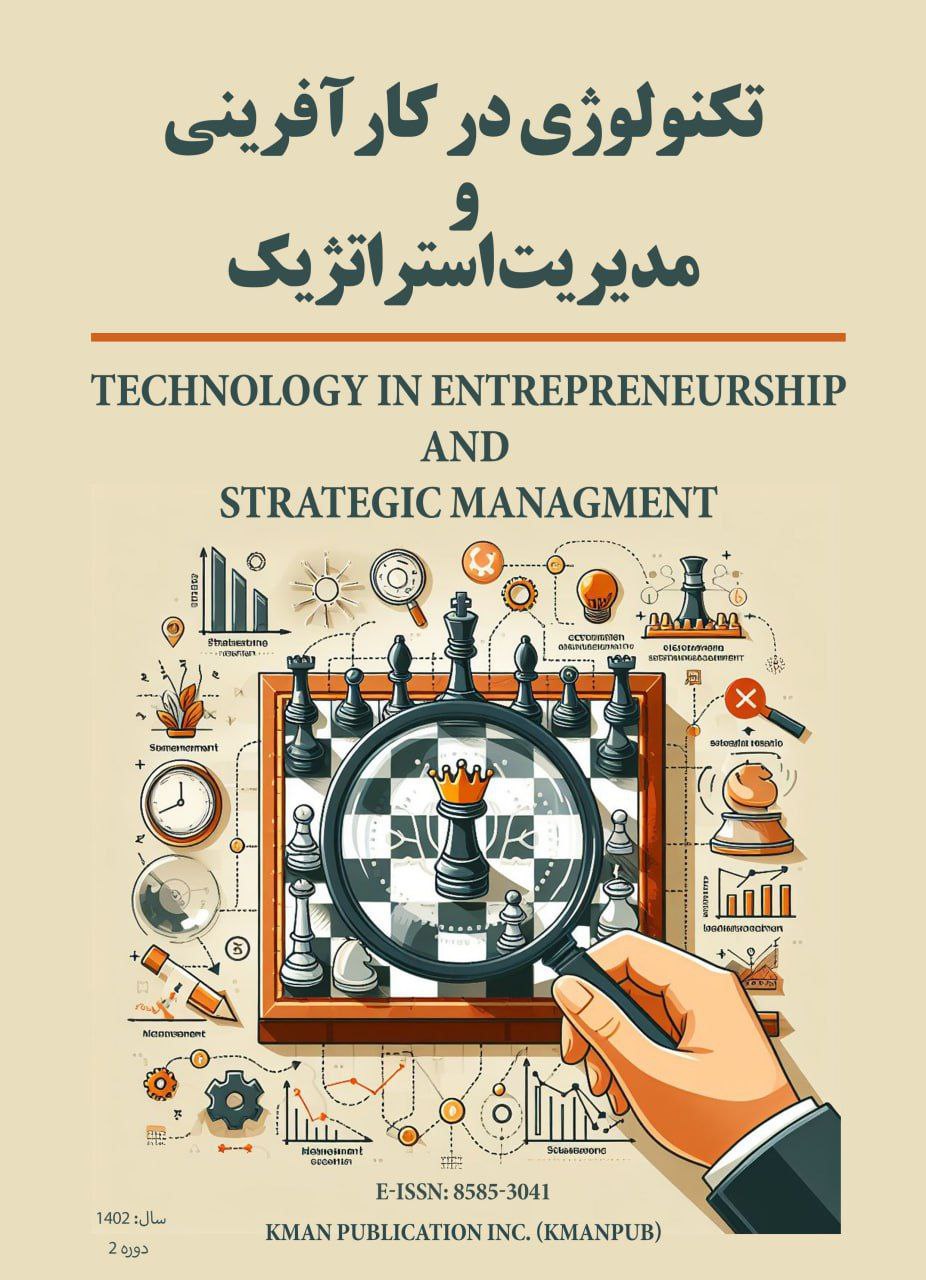ارائه الگوی بهینه سازی فین تک براساس شاخصهای هوش مصنوعی در بازار مالی
کلمات کلیدی:
هوش مصنوعی, فین تک, بازار مالی, ژنتیک مرتب سازی نامغلوبچکیده
هدف پژوهش ارائه الگوی بهینه سازی فین تک براساس شاخصهای هوش مصنوعی در بازار مالی بوده است. پژوهش به علت ارائه الگو از نوع پژوهشهای اکتشافی است و چون بهره وران از نتایج آن استفاده میکنند، کاربردی تلقی میشود. الگوریتم ژنتیک مرتب سازی نامغلوب (NSGA-II) به عنوان یک روش فراابتکاری برای حل 9 شبیه سازی مسئله مورد استفاده قرار گرفت سپس جوابهای بدست آمده از این روش با روش اپسیلن محدودیت مقایسه شدند، ارتباط بین جوابها نشاندهنده آن است که الگوریتم توسعه داده شده NSGA-II توانایی رسیدن به جواب مناسب در زمان کوتاهتر در مقایسه با روش اپسیلن محدودیت علیالخصوص برای تست مسئلههای بزرگ مقیاس را دارا میباشد. نتایج حاصل از حل مدل ریاضی پیشنهادی با ارائه نه شبیه سازی مسئله به وسیله الگوریتمهای مورد نظر بیان شده و در نرم افزار GAMS و MATLAB حل گردید. مدلی که در این تحقیق در نظر گرفته شده است یک مدل دو هدفه برای حداقل سازی حرکات بین سلولی و خرید فین تک (تشکیل سلول) و بیشینه سازی روابط عملگرهای هوش مصنوعی با ملاحظات شبکهای و کارایی عملگرها بر روی فین تکها (تخصیص عملگر) میباشد. این الگو، نه تنها بهبود در کارایی فین تکها را فراهم میکند بلکه با ارائه رویکردی نوین و مؤثر، امکان تطبیق با چالشهای مختلف بازار مالی را نیز فراهم میسازد. از این رو، استفاده از این الگوی بهینهسازی میتواند به بهبود عملکرد و سودآوری در بازار مالی کمک کرده و به توسعه و پیشرفت در فضای مالی کمک نماید.
دانلودها
مراجع
Abad-Segura, E., González-Zamar, M.-D., López-Meneses, E., & Vázquez‐Cano, E. (2020). Financial Technology: Review of
Trends, Approaches and Management. Mathematics, 8(6), 951. https://doi.org/10.3390/math8060951
Abdul-Rahim, R., Bohari, S. A., Aman, A., & Awang, Z. (2022). Benefit–Risk Perceptions of FinTech Adoption for
Sustainability From Bank Consumers’ Perspective: The Moderating Role of Fear of COVID-19. Sustainability, 14(14),
https://doi.org/10.3390/su14148357
Abuzov, A. Y. (2023). The Role of Technological Innovations in Institutional Regulation of the Financial Capital Market. E3s
Web of Conferences, 376, 05047. https://doi.org/10.1051/e3sconf/202337605047
Al-Okaily, M., Alkhwaldi, A. F., Abdulmuhsin, A. A., Alqudah, H., & Al-Okaily, A. (2022). Cloud-Based Accounting
Information Systems Usage and Its Impact on Jordanian SMEs’ Performance: The Post-Covid-19 Perspective. Journal of
Financial Reporting and Accounting, 21(1), 126-155. https://doi.org/10.1108/jfra-12-2021-0476
Aloulou, M. (2023). Does FinTech Adoption Increase the Diffusion Rate of Digital Financial Inclusion? A Study of the Banking
Industry Sector. Journal of Financial Reporting and Accounting, 22(2), 289-307. https://doi.org/10.1108/jfra-05-2023-
Bandyopadhyay, P. (2022). A Study on Integration of Applied Artificial Intelligence in Accounting, Finance, Insurance, and
E-Commerce Sectors. Multimedia Research, 5(2), 15-19. https://doi.org/10.46253/j.mr.v5i2.a3
Belanche, D., Casaló, L. V., & Flavián, C. (2019). Artificial Intelligence in FinTech: Understanding Robo-Advisors Adoption
Among Customers. Industrial Management & Data Systems, 119(7), 1411-1430. https://doi.org/10.1108/imds-08-2018-
Deng, X., Huang, Z., & Xiang, C. (2019). FinTech and Sustainable Development: Evidence From China Based on P2P Data.
Sustainability, 11(22), 6434. https://doi.org/10.3390/su11226434
Dunis, C. L., Middleton, P. W., Karathanasopolous, A., & Theofilatos, K. (2016). Artificial Intelligence in Financial Markets.
https://doi.org/10.1057/978-1-137-48880-0
El-Said, H. M. (2021). A Review of Literature Directions Regarding the Impact of Fintech Firms on the Banking Industry.
Qualitative Research in Financial Markets, 15(5), 693-711. https://doi.org/10.1108/qrfm-10-2020-0197
Kazachenok, O. P., Stankevich, G. V., Chubaeva, N. N., & Tyurina, Y. (2023). Economic and Legal Approaches to the
Humanization of FinTech in the Economy of Artificial Intelligence Through the Integration of Blockchain Into ESG
Finance. Humanities and Social Sciences Communications, 10(1). https://doi.org/10.1057/s41599-023-01652-8
Kini, A. N., & Basri, S. (2022). An Empirical Examination of Customer Advocacy Influenced by Engagement Behaviour and
Predispositions of FinTech Customers in India. F1000research, 11, 27. https://doi.org/10.12688/f1000research.74928.2
Lagna, A., & Ravishankar, M. N. (2021). Making the World a Better Place With Fintech Research. Information Systems
Journal, 32(1), 61-102. https://doi.org/10.1111/isj.12333
Rizinski, M., Peshov, H., Mishev, K., Chitkushev, L. T., Vodenska, I., & Trajanov, D. (2022). Ethically Responsible Machine
Learning in Fintech. IEEE Access, 10, 97531-97554. https://doi.org/10.1109/access.2022.3202889
Sheng, Y., Fu, K., & Liang, J. (2022). Construction of a Fundamental Quantitative Evaluation Model of the a-Share Listed
Companies Based on the BP Neural Network. Computational Intelligence and Neuroscience, 2022, 1-12.
https://doi.org/10.1155/2022/7069788
Utami, A. F., Ekaputra, I. A., & Japutra, A. (2021). Adoption of FinTech Products: A Systematic Literature Review. Journal
of Creative Communications, 16(3), 233-248. https://doi.org/10.1177/09732586211032092
Yeh, J.-Y., & Chen, C. H. (2020). A Machine Learning Approach to Predict the Success of Crowdfunding Fintech Project.
Journal of Enterprise Information Management, 35(6), 1678-1696. https://doi.org/10.1108/jeim-01-2019-0017
Zhou, M., & Zheng, X. (2021). Evaluation of the Development of Fintech-Served Real Economy Based on Fintech
Improvement. Discrete Dynamics in Nature and Society, 2021, 1-10. https://doi.org/10.1155/2021/4836933
دانلود
چاپ شده
شماره
نوع مقاله
مجوز
حق نشر 2023 تکنولوژی در کارآفرینی و مدیریت استراتژیک

این پروژه تحت مجوز بین المللی Creative Commons Attribution-NonCommercial 4.0 می باشد.











